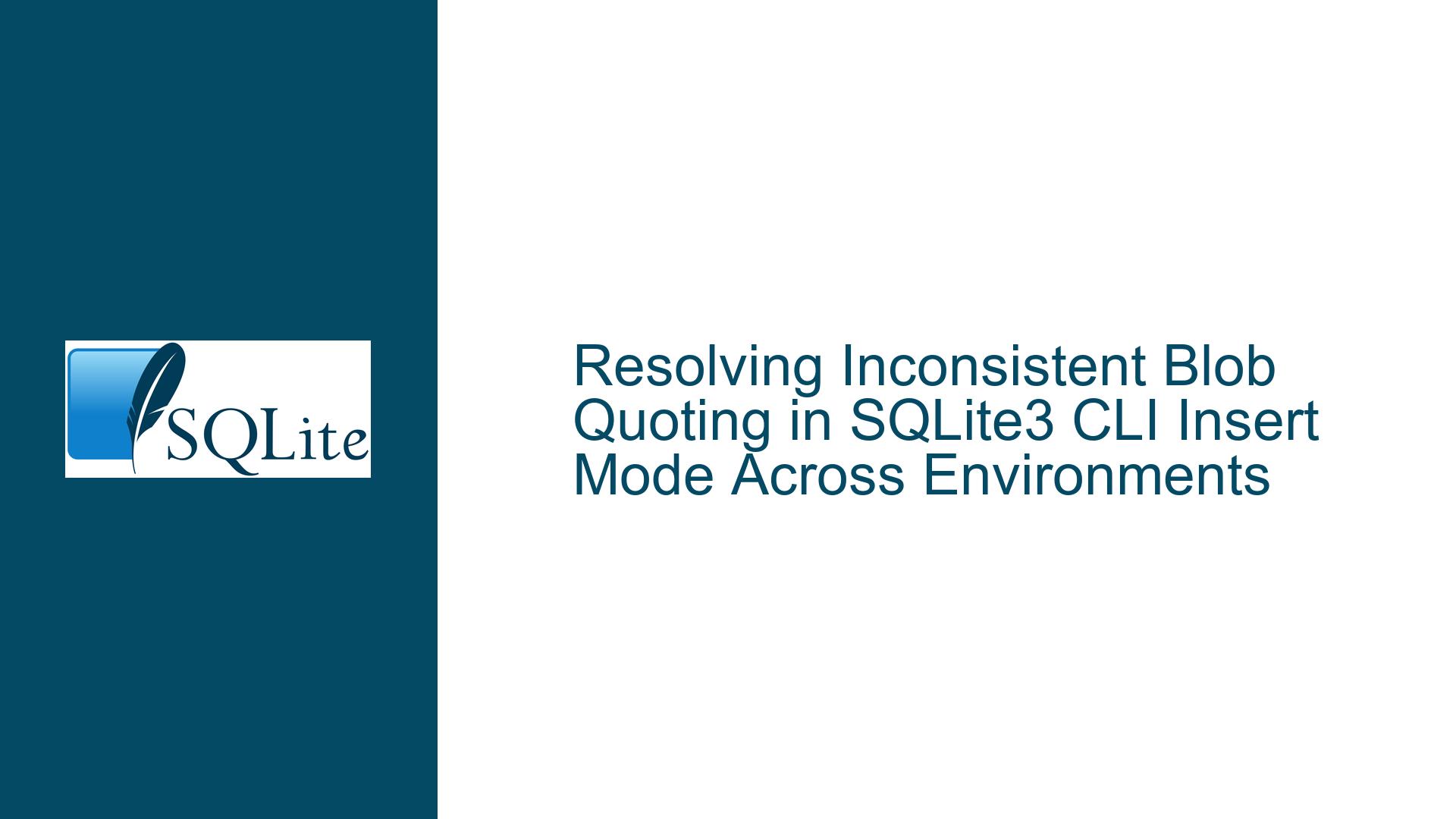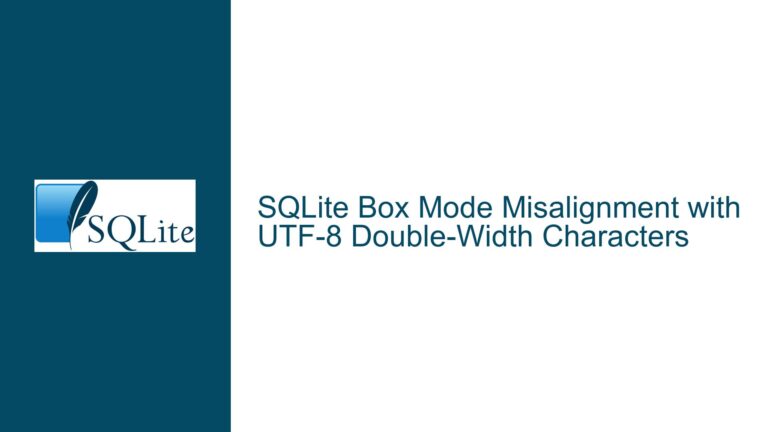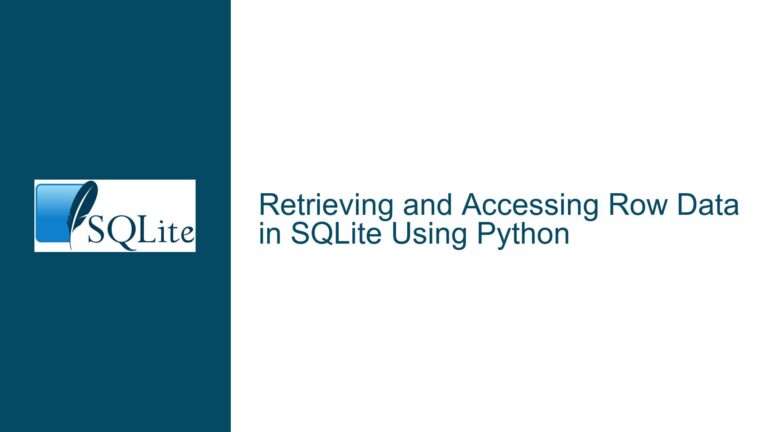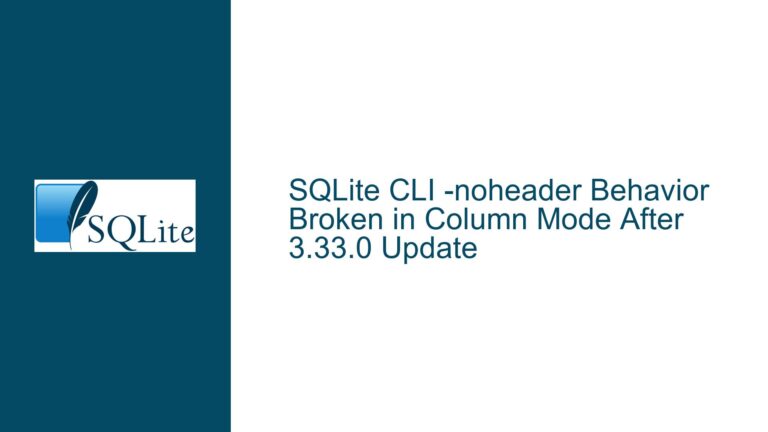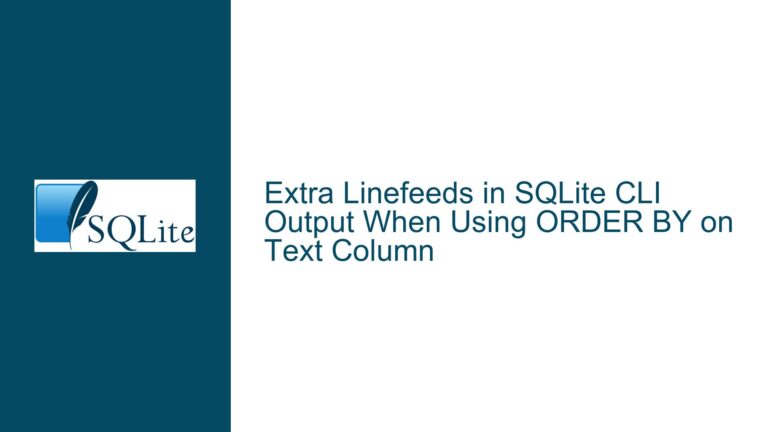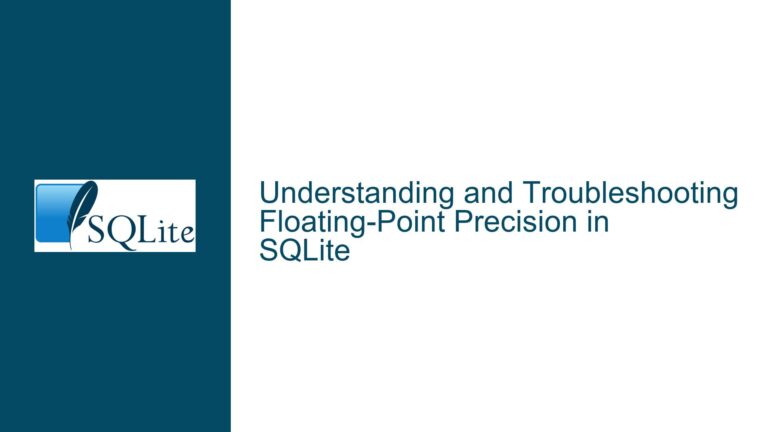Resolving Inconsistent Blob Quoting in SQLite3 CLI Insert Mode Across Environments
Issue Overview: SQLite3 CLI .mode Insert Generates Unquoted Binary Blobs Locally but Quoted Blobs Over SSH
The core challenge involves inconsistent formatting of binary blob data when using the SQLite3 command-line interface (CLI) .mode insert directive to export table data. Users report that executing SELECT * FROM [table] in local environments produces unquoted binary blobs with garbled special characters, while the same command executed over SSH generates properly quoted blob literals using the X'...' hexadecimal syntax. This discrepancy persists despite claims of identical SQLite3 versions and Linux distributions across environments. The absence of consistent blob quoting disrupts data integrity during export/import workflows, particularly when binary data (e.g., images, serialized objects) is involved. The CLI’s unpredictable behavior raises questions about environmental dependencies, version discrepancies, and hidden configuration overrides that influence output formatting.
Possible Causes: Version Mismatches, Environment-Specific Configurations, and Terminal Type Differences
SQLite3 CLI Version Fragmentation
While users may assert identical SQLite3 versions, subtle differences in build options, patch levels, or compilation flags can alter .mode insert behavior. The SQLite3 CLI’s handling of binary blobs in insert mode evolved over time. Older versions (pre-3.34.0) lacked robust blob detection heuristics, leading to unquoted binary output when terminal environments misinterpreted non-printable bytes. Newer versions enforce strict X'...' syntax for blobs regardless of terminal capabilities. Version comparisons must account for not only the major.minor.patch triplet but also compilation dates and source branches (e.g., amalgamation vs. system packages).
Terminal Environment and Locale Settings
Local terminals often configure locale settings (e.g., LANG, LC_CTYPE) and character encoding (e.g., UTF-8, ASCII) that influence how binary data is rendered. When the SQLite3 CLI detects a TTY (interactive terminal), it may apply terminal-specific escaping rules, stripping quotes or converting blob bytes to control characters. Over SSH, non-interactive shells or redirected stdout pipelines suppress TTY-specific formatting, triggering the CLI’s fallback to hexadecimal blob literals. Environment variables like TERM or SQLITE3_INSERT_MODE_QUOTE_BLOBS (hypothetical) could further modulate this behavior.
Configuration File Overrides and Command-Line Flags
The SQLite3 CLI reads initialization commands from ~/.sqliterc, .sqlite3rc, or command-line arguments like -init. Undetected configuration files might override .mode insert with custom formatting rules, suppress blob quoting, or inject silent pragmas like PRAGMA encoding. Similarly, omitted flags like -bail or -batch in scripting contexts alter error handling and output buffering, indirectly affecting blob representation.
Troubleshooting Steps, Solutions & Fixes: Enforcing Consistent Blob Quoting in SQLite3 CLI Exports
Step 1: Validate SQLite3 CLI Version and Build Details
Execute sqlite3 --version on both local and remote systems. Compare version numbers, compilation dates, and source identifiers. For example:
$ sqlite3 --version
3.37.2 2022-01-06 13:25:41 872ba256cbf61d9290b571c0e6d82a20c224ca3ad82971edc46b29818d5dalt1
Note the YYYY-MM-DD date and commit hash suffix. Even identical version numbers with differing compilation dates may exhibit divergent behavior. If versions differ, update the local SQLite3 CLI using precompiled binaries from sqlite.org/download or package managers.
Step 2: Isolate Configuration File Influences
Run the SQLite3 CLI with the -init /dev/null flag to bypass user-defined configuration files:
sqlite3 -init /dev/null mydb.db "SELECT * FROM mytable"
If blob quoting becomes consistent, inspect ~/.sqliterc, ~/.sqlite3rc, or system-wide configuration files for conflicting directives like .mode csv, .output, or custom shell functions. Remove or comment out lines that modify output modes or blob handling.
Step 3: Force Hexadecimal Blob Literals via CAST or Auxiliary Queries
Modify the SELECT query to explicitly cast blob columns as hexadecimal literals using SQL functions:
SELECT quote(x), ... FROM mytable;
The quote() function converts BLOBs to X'...' strings and TEXT to quoted strings. Combine this with .mode insert to ensure consistent formatting:
sqlite3 mydb.db ".mode insert target_table" "SELECT quote(x), y, z FROM mytable"
Alternatively, create a temporary view that applies quote() to blob columns:
CREATE TEMP VIEW export_view AS SELECT quote(x) AS x, y, z FROM mytable;
.mode insert target_table
SELECT * FROM export_view;
Step 4: Standardize Terminal Environments and Output Redirection
Local terminal misbehavior often stems from TTY-specific rendering. Redirect output to a file or pipe to emulate non-interactive SSH sessions:
sqlite3 mydb.db ".mode insert" "SELECT * FROM mytable" > output.sql
Compare output.sql with SSH-generated output. If discrepancies persist, set the terminal type to dumb or override locale settings:
export TERM=dumb
export LANG=C
sqlite3 mydb.db ".mode insert" "SELECT * FROM mytable"
Step 5: Utilize External Tools for Blob Conversion
When SQLite3 CLI limitations persist, employ scripting languages like Python or Perl to convert binary blobs to hexadecimal literals. Example Python script:
import sqlite3
conn = sqlite3.connect('mydb.db')
cursor = conn.cursor()
cursor.execute("SELECT * FROM mytable")
for row in cursor:
values = []
for value in row:
if isinstance(value, bytes):
values.append(f"X'{value.hex()}'")
else:
values.append(repr(value))
print(f"INSERT INTO mytable VALUES ({', '.join(values)});")
Execute this script in both environments to bypass CLI inconsistencies entirely.
Step 6: Compile a Custom SQLite3 CLI with Forced Blob Quoting
For advanced users, modify the SQLite3 CLI source code to enforce X'...' syntax in .mode insert. In the shell.c source, locate the output_hex_blob function and ensure it is unconditionally called for BLOB types in appendValue (near line 2100 in SQLite3 3.37.2):
case SQLITE_BLOB: {
output_hex_blob(p, pItem->zText, pItem->nText);
break;
}
Recompile and replace the system sqlite3 binary.
Step 7: Verify Database Encoding and Storage Classes
Ensure blob columns are explicitly typed as BLOB in the schema. SQLite3’s dynamic typing may inadvertently store bytes in TEXT columns if inserted via string literals without X'...'. Recreate the table with strict typing:
CREATE TABLE mytable (x BLOB);
Re-insert data using X'...' literals to enforce blob storage class.
By systematically addressing version discrepancies, environmental variables, configuration overrides, and output handling, users can enforce consistent blob quoting in SQLite3 CLI exports, ensuring data fidelity across local and remote execution contexts.
